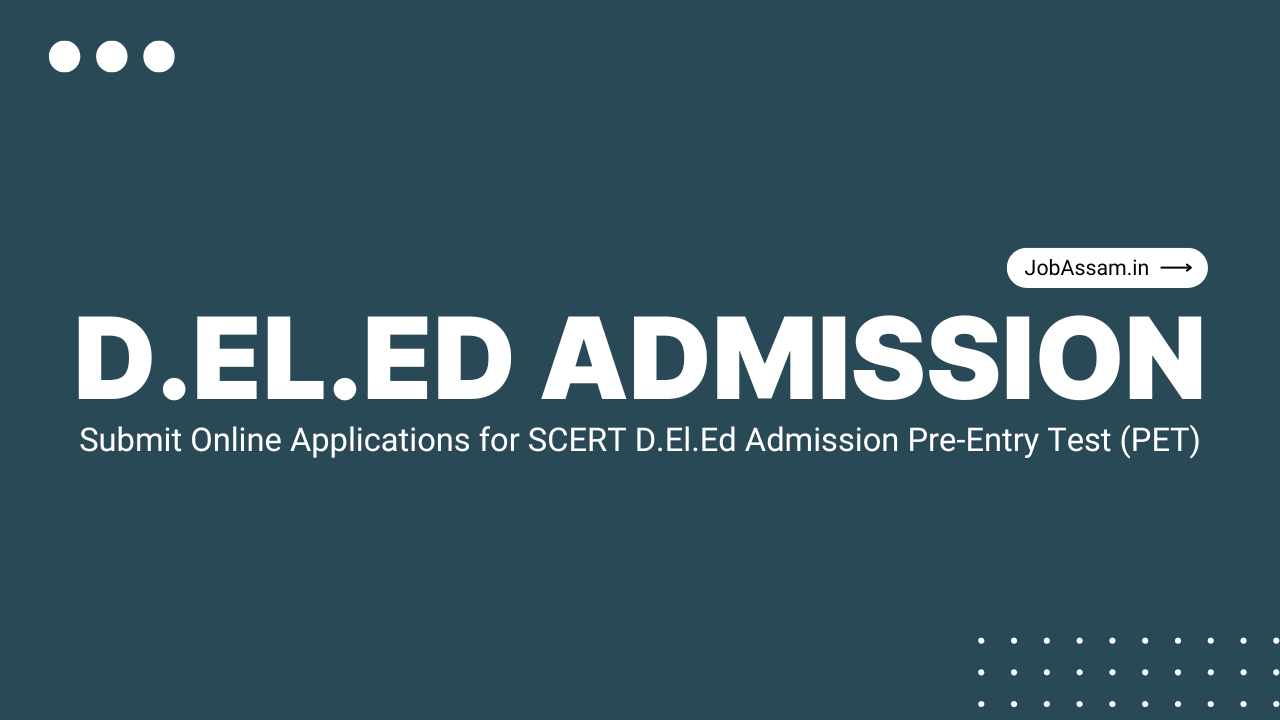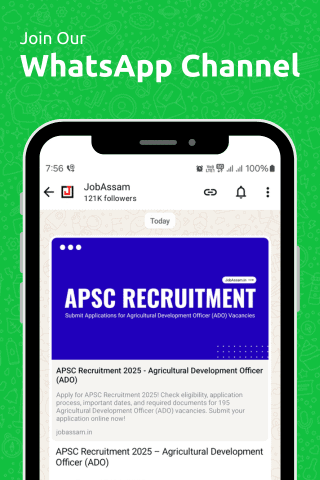| Exam Name | Pre-Entry Test |
| Exam Type | Entrance Exam |
| Course | D.El.Ed. |
| Organization | SCERT, Assam |
| Qualification | 12th Pass |
| Apply Mode | Online |
| Apply Fee | ₹600/- |
| Start Date | 18 May 2025 |
| Last Date | 15 June 2025 |
Assam D.El.Ed Admission 2025
As per the latest notification, the State Council of Educational Research and Training (SCERT), Assam will be conducting a Pre-Entry Test (PET) for admission to the Diploma in Elementary Education (D.El.Ed) program offered at various Government Teacher Education Institutes (TEIs) under its supervision. According to the official notification, the online application process for Assam D.El.Ed Admission is set to begin from 18th May 2025. Candidates who have successfully completed their Higher Secondary (HSSLC) or Class XII examination are eligible to apply for this entrance examination. Interested applicants can submit their applications through the official website of SCERT, Assam. This entrance test serves as a gateway for students looking to pursue a career in elementary education through this diploma program.
SCERT D.El.Ed Admission Details
Exam Name: Pre-Entry Test (PET) 2025
Course Name: Diploma in Elementary Education (D.El.Ed.)
Academic Session: 2025-27
Organization: State Council of Educational Research and Training (SCERT)
Exam Date: 13 July 2025
Exam Duration: 2 Hours
Exam Centres: The Pre-Entry Test (PET) venue will be allocated in the district selected by candidates during their application submission, with the exact location clearly mentioned on their admit cards. Selected candidates will be allotted seats in the Teacher Education Institutes (TEIs) located within the same district where they chose to appear for the Pre-Entry Test.
Total Marks: 100 Marks
Total Questions: 100 Questions
Question Type: Multiple Choice Questions
Negative Marking: For every incorrect answer, a 0.25 mark shall be deducted from the total marks secured by the candidate. More than one answer given to a question will be treated as an incorrect answer.
Examination Fee: Candidates applying for the Assam D.El.Ed Admission Entrance Examination are required to pay a non-refundable examination fee of ₹600/-.
Educational Qualification: Candidates must have passed Higher Secondary (10+2) or its equivalent examination from recognized Boards/Councils with at least 50% marks in aggregate, excluding marks secured in extra optional subjects. For SC/ST category candidates, there is a 5% relaxation, requiring them to secure at least 45% marks in aggregate.
Age Limit: The candidate must not be less than 18 years old and not more than 34 years old as of 1st July 2025. There will be a relaxation of 2 years for candidates belonging to SC, ST(P) and ST(H) categories, allowing them to apply up to the age of 36 years.
Reservation: Reservation of seats for the candidates belonging to reserved categories including OBC/MOBC, SC, ST(P), ST(H), and Person with Disability (PWD) will be as per the Reservation Policy.
How to Apply for D.El.Ed Admission?
Eligible candidates can submit their applications for the SCERT D.El.Ed Admission through the official website. The online application process will begin from 18th May 2025. To apply, candidates will first need to register on the portal by creating their account. After successful registration, they can log in using their newly created credentials to access the application form.
Once logged in, the application form will be displayed where candidates will need to fill in their personal and educational details carefully. They will also be required to upload certain documents, including a recent passport-sized photograph and their signature in the specified file format and size. It’s important to ensure that all uploaded documents meet the required specifications to avoid rejection of the application.
After completing all the required sections and uploading the necessary documents, candidates will proceed to pay the applicable examination fee using the online payment gateway provided on the website. The application will only be considered submitted after successful payment of this fee. Upon completion, an acknowledgment receipt will be generated, which candidates should save and print for future reference. This receipt serves as proof of successful application submission and will be required for future correspondence.
Important Dates of Assam D.El.Ed Admission
| Notification Date | 18 May 2025 |
| Apply Start Date | 18 May 2025 |
| Apply End Date | 5 June 2025 |
| Admit Card | 5 July 2025 |
| PET Exam | 13 July 2025 |
| PET Result | 28 July 2025 |
Important Links of SCERT D.El.Ed Admission
| Application Form | Click Here |
| Official Notification | Click Here |
| Information Brochure | Click Here |
| WhatsApp Channel | Click Here |
| Install Android App | Click Here |
| Official Website | Click Here |



I have 40% in H.S can I eligible for apply PET ?
NO at least 45% marks in H.S
No , you can’t .
Correction window ketiya open hobo
Bihar student married in assam that can apply for this course?
GNM & DELED exam ek he date me hain tu dono apply karne wale ke liya Kiya hoga
I applied on the 15th , I paid but why didn’t the application ?
অন্তিম তাৰিখ পাৰ হৈ গ’ল, এতিয়া apply কৰিব পৰা যাবনে
nope